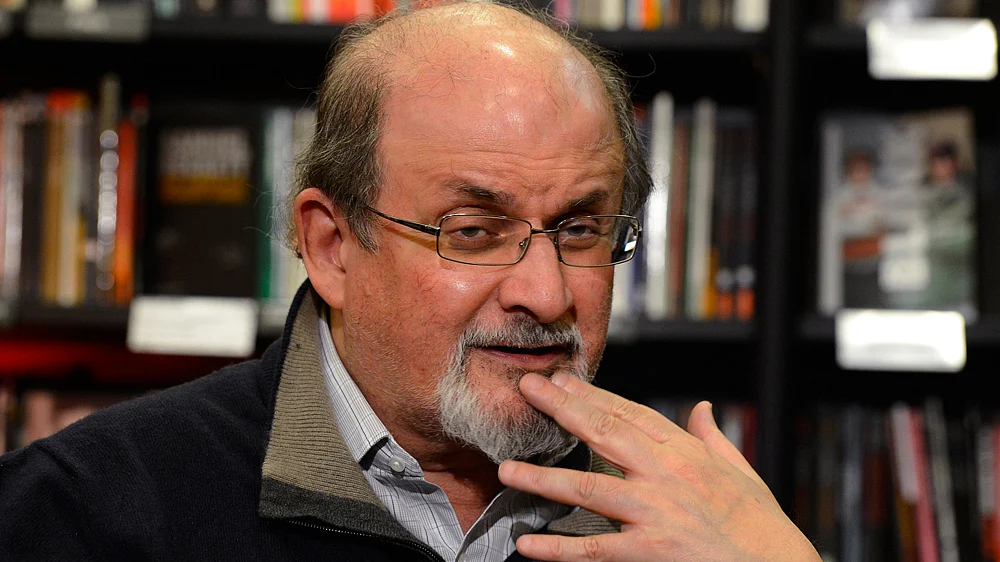
Rushdie’s New Book Marries Batman to the Iliad, Fantasy to Realism
Salman Rushdie is in a playful mood for his magical New York fantasy novel

advertisement
A new Salman Rushdie novel is like a new film starring the other Salman. Which is not to say that it is vapidly inscrutable or unfortunately divorced from reality but that it is impossible to ignore. And if you are a serious literature enthusiast who found any part of that statement blasphemous, well, we just got ourselves into some characteristic Salman Rushdie territory. In his latest offering, Two Years Eight Months and Twenty-Eight Nights (a do-the-math title, if there ever was one), Rushdie does what he does best – he defies expectations, plots a complex narrative, exercises his acerbic wit and uses fantasy as a tool of social commentary.
The book opens with the eighteenth century Spanish artist Francisco Goya’s etching, “The sleep of reason” and immediately draws the reader into a world where reason and rationality are clearly under threat. In an elaborate epilogue, Rushdie constructs a charming historiography of his cast of characters, the jinn – creatures of smokeless fire and participants in the War of the Worlds, the primary event on which the narrative rests – a war between light and darkness, good and evil, freedom and control.
He tells us the story of Dunia, a princess of the jinn, an Asmaan Peri who falls in love with the twelfth century Islamic philosopher, Ibn Rushd (insert quick reference to Rushdie’s father changing his family name to honour said philosopher), also known as Averroes of Spain. Dunia spends two years, eight months and twenty-eight days (one thousand and one, in case you are still reluctant to do the math), with her mortal lover, in the course of which he tells her stories, in a sort of gender reversal of the Scheherazade-Shahryar One Thousand and One Nights, and she bears him children – large broods that go out and populate the world. It is these children who come into their jinn powers once the city of New York is hit by a storm, in a future, only a few years from our present.
Fantasy to Explore Social Reality
Two Years takes a step beyond Rushdie’s typical magic-realism and uses fantasy as a clever lens to look into social reality. The narrative voice tells the reader, “…to tell a story about the past is to tell a story about the present. To recount a fantasy, a story of the imaginary, is also a way of recounting a tale about the actual.”
Rushdie thus, makes unfamiliar the familiar, forcing the reader to look at world events anew, whether it is the history of Afghanistan, plunged from an era of reform into the ruthless bigotry of Taliban control, or the change of name of the author’s beloved Bombay, making it “the new, uglier Mumbai”, or even the reference to the President of the United States during the time of the Great War – “an unusually intelligent man, eloquent, thoughtful, subtle, measured in word and deed, a good dancer (though not as good as his wife)”, unable to respond to the monstrosity of violence.
Homage to Popular Culture
One of the things that stands out in the text is its (possibly) tongue-in-cheek homage to popular culture. Rushdie, as a true spokesman of this age, calls attention to the new mythos – one where the ancient gods are set up in competition with the Marvel and DC heroes of the post-atheist world. There are references to Scott Pilgrim and Skynet, vampire legends and Thomas Hardy, as well as the possibility of the Batman saga turning into the modern day Iliad. Blasphemous? But then we already covered that in the very beginning.
The complex world of Two Years revisits many standard-issue Rushdie tropes. It engages with the idea of lost home that cannot be reclaimed. It critiques religious structures, positing them as the points of origin of conflict and violence, the gateways to manic irrationality. It operates through digressions and refuses to settle into one cohesive narrative. It parodies and pastiches its way through older narratives, older voices. For its seeming self-absorption and its chaotic structure, the book will possibly see its fair share of criticism.
If, however, dysfunctional magic carpets, stories within stories, and the hopelessness of love in a mutable universe be your preferred drug, two years eight months and twenty-eight nights, is perhaps how long you might be chuckling about this one.
(Saloni Sharma reads an absurd number of books each year and is hopeful it’ll become a paying profession some day. Meanwhile, she teaches Literatures in English at Kirori Mal College, DU.)
(At The Quint, we question everything. Play an active role in shaping our journalism by becoming a member today.)
- Access to all paywalled content on site
- Ad-free experience across The Quint
- Early previews of our Special Projects
Published: 15 Sep 2015,12:03 PM IST